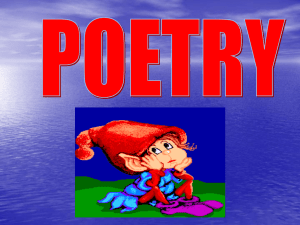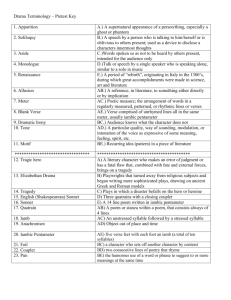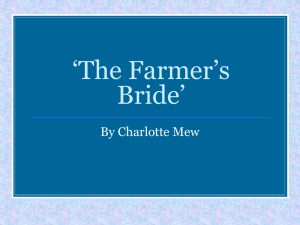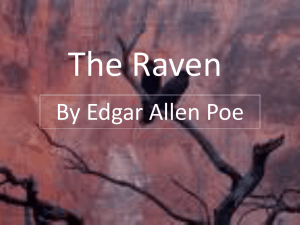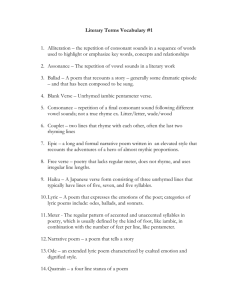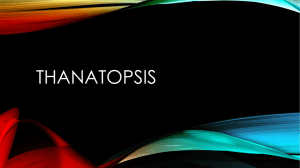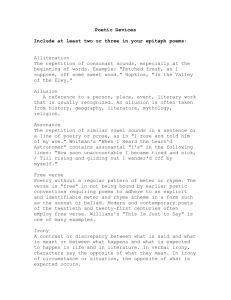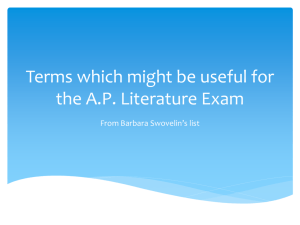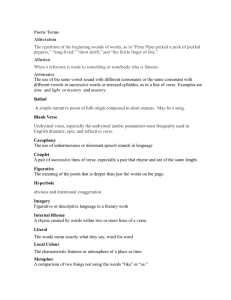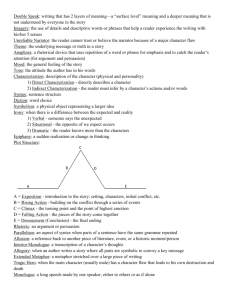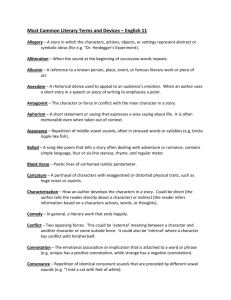ENGLISH LITERATURE VOCABULARY TERMS Terms Definitions
advertisement
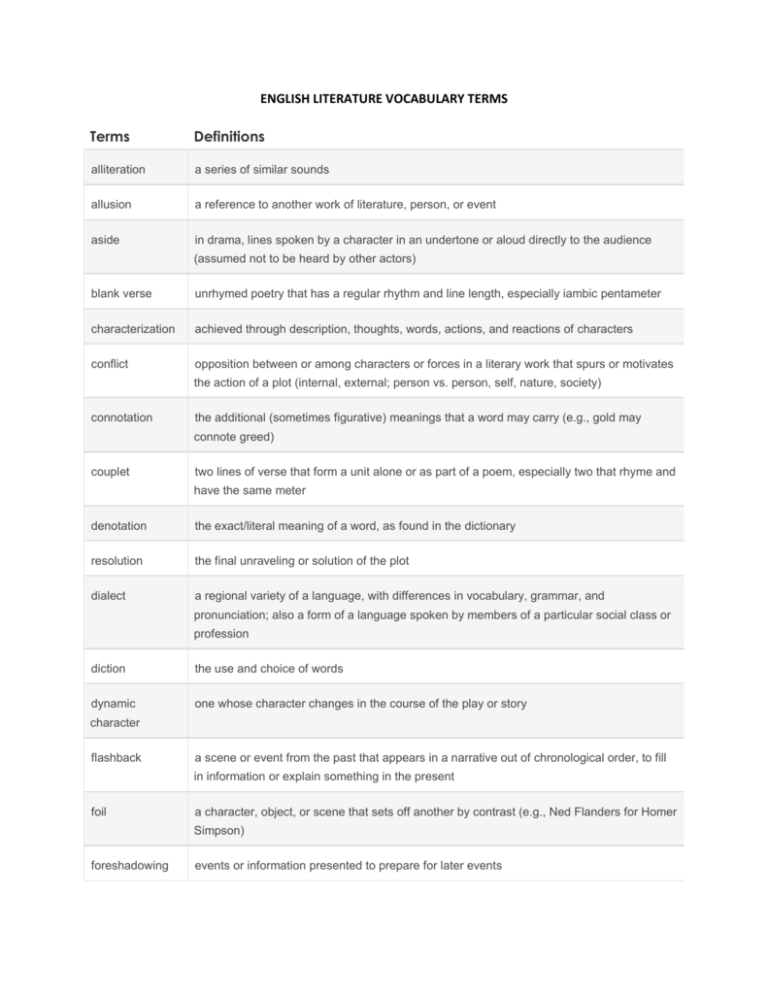
ENGLISH LITERATURE VOCABULARY TERMS Terms Definitions alliteration a series of similar sounds allusion a reference to another work of literature, person, or event aside in drama, lines spoken by a character in an undertone or aloud directly to the audience (assumed not to be heard by other actors) blank verse unrhymed poetry that has a regular rhythm and line length, especially iambic pentameter characterization achieved through description, thoughts, words, actions, and reactions of characters conflict opposition between or among characters or forces in a literary work that spurs or motivates the action of a plot (internal, external; person vs. person, self, nature, society) connotation the additional (sometimes figurative) meanings that a word may carry (e.g., gold may connote greed) couplet two lines of verse that form a unit alone or as part of a poem, especially two that rhyme and have the same meter denotation the exact/literal meaning of a word, as found in the dictionary resolution the final unraveling or solution of the plot dialect a regional variety of a language, with differences in vocabulary, grammar, and pronunciation; also a form of a language spoken by members of a particular social class or profession diction the use and choice of words dynamic one whose character changes in the course of the play or story character flashback a scene or event from the past that appears in a narrative out of chronological order, to fill in information or explain something in the present foil a character, object, or scene that sets off another by contrast (e.g., Ned Flanders for Homer Simpson) foreshadowing events or information presented to prepare for later events free verse verse without a fixed metrical pattern, usually having unrhymed lines of varying length (a.k.a., vers libre) iambic the most common rhythm in English poetry, consisting of five iambs in each line (iamb=unit pentameter of one short/unstressed syllable followed by one long/stressed syllable) imagery description that appeals to the senses (sight, sound, smell, touch, taste) inversion an alteration of the normal order of words or phrases in a grammatical construction, usually for rhetorical effect irony when reality is different from appearance; the implied meaning of a statement is the opposite of its literal or obvious meaning situational irony occurs when the outcome of a work is unexpected, or events turn out to be the opposite from what one had expected verbal irony occurs when what is said contradicts what is meant or thought dramatic irony occurs when another character(s) and/or the audience know more than one or more characters on stage about what is happening metaphor an imaginative comparison used to enhance the meaning of what is being compared; may be direct (X is Y) or implied ("He wanted to win her heart" comparing love to a battle) meter an arranged pattern of rhythm in a line of verse narrator tells the story in a prose piece speaker tells the story in a poetic piece onomatopoeia the use of words that by their sound suggest their meaning oxymoron a figure of speech consisting of two apparently contradictory terms personification when something nonhuman is given human characteristics (must be HUMAN, or it's a metaphor) plot the pattern of events in a play, poem, or fictional work. point of view the perspective from which the writer tells the story (1st, 2nd, 3rd person; omniscient, limited omniscient) pun a play on words involving the use of words with similar sounds but different meanings (collar, color), words with 2+ meanings (plain), or words with the same sound but different meanings (sun/son) repetition repeating a word or phrase, or rewording the same idea rhyme similar or identical sounds near each other (usually in two or more lines of poetry) rhyme scheme the pattern of rhyme in a poem rhythm a mood or effect in a text created from repeated elements (could be euphonous, cacophanous, staccato, etc.) setting the time(s) and place(s) of a story simile a similarity between two objects or ideas, using like or as (and sometimes than) soliloquy in drama, a character speaks alone on stage to allow his/her thoughts and ideas to be conveyed to the audience sonnet a short poem with fourteen lines, usually ten-syllable rhyming lines, divided into two, three, or four sections stanza a group of lines in a poem or song that constitute a division (in prose: paragraph) static character a character who does not change at all, or who remains almost entirely the same, throughout the course of a play or story symbol something that stands for itself at a literal level but which also suggests something (or several things) at the same time; frequently a concrete object or animal that represents a quality or abstract idea theme central idea tone the mood of a work (often several in one work)
